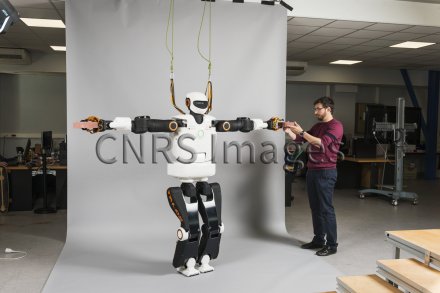Production year
2017

© Cyril FRESILLON / LAAS / CNRS Images
20170051_0018
Pyrène, a humanoid robot, lifting bricks with its gripper-hands. Its two grippers let it lift objects weighing 6 kg without damaging them. The robot has a complex structure equipped with 32 electric motors. Its specifications were drawn up by the robotics team at LAAS, and it was manufactured by the company PAL Robotics. Pyrène has been designed to carry heavy loads, go up and down stairs, adapt to unstable ground and use tools to perform complex actions. Excellent perception of its environment and high computing power should enable it to react rapidly to any unexpected situations. An inertial measurement unit helps it keep its balance, like the inner ear in humans, while its depth-perception camera lets it see objects so it can neatly step round them. Research scientists are using Pyrène to study the principles that govern human movement, with a view to designing practical applications such as prostheses. Pyrène can also perform tasks that are dangerous or demanding for humans, for example in industrial settings.
The use of media visible on the CNRS Images Platform can be granted on request. Any reproduction or representation is forbidden without prior authorization from CNRS Images (except for resources under Creative Commons license).
No modification of an image may be made without the prior consent of CNRS Images.
No use of an image for advertising purposes or distribution to a third party may be made without the prior agreement of CNRS Images.
For more information, please consult our general conditions
2017
Our work is guided by the way scientists question the world around them and we translate their research into images to help people to understand the world better and to awaken their curiosity and wonderment.